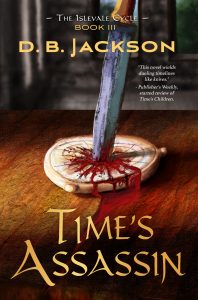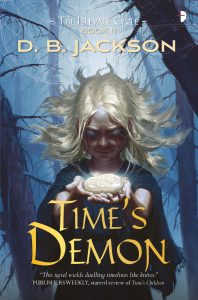A good idea remains such, regardless of the market and our inability to execute that idea when first it comes to us. Sometimes we need to grow into the ambition of certain projects.
Let me tell you about my trunk novels. Not all of them – that would take a while. But I have two in particular, the first two books of what I once thought might be a three- or four-book series, that I have been working on for the past week or so.
Many of us have trunk novels and don’t even know it. For those unfamiliar with the term, a trunk novel is a book – complete or partial – that we worked on for a time and then put away, for any number of reasons. The idea is, we shove them in a trunk somewhere – metaphorical? Metaphysical? – and try to forget about them.
Sometimes we put these projects away because we can’t sell them. Sometimes, we are so convinced that the books are deeply, deeply flawed, that we don’t even try to sell them. Sometimes we get feedback on the books – suggestions for revisions – that we’re unwilling or at least not ready to implement. Sometimes we write something, but the market is not right at that moment for the book in question.
I put these books away for several of those reasons. I LOVE the first book, but the market wasn’t right for it. And while I thought it had some great moments, I also knew that it needed serious revision. The prose needed tightening. It had too much exposition, which was slowing down sections that should have been punchy and concise. The second book… well, the second book was a hot mess. Again, I liked elements of it, loved certain passages and plot twists. But I never did figure out the ending. I knew it needed to be torn apart and put back together and I had neither the patience to undertake such a massive rewrite nor a concrete vision of what I wanted the book to look like.
I wrote these books several years back, and around the time I might have forced myself to tackle the revisions, we sold the Justis Fearsson series. Into the proverbial trunk they went. I got them out a couple of years later, but then we sold the Islevale novels and I shut the lid on the trunk once more.
Now, though, with the Thieftaker novellas in edits, with other projects lurking but failing to excite me, I have opened the trunk once more and taken out the books, determined this time to do something with them. My old impressions of the novels remain intact. I still love the first book, but see serious problems with the writing and the excess exposition. And I still see potential in the second book, but it remains a train wreck.
What are the books about? Well, they’re sort of a blend of Celtic fantasy and urban fantasy. Hence the marketing issues. Urban fantasy is well past its peak, and Celtic stories have long since flooded the market. There is no strong demand for either. That doesn’t mean, though, that there won’t be again. Or that my readers wouldn’t be interested in new novels, even if they are not on the cutting edge of what New York publishing considers “hot” and “trendy.” Self-publishing and small press publishing make it easier than ever to bypass the marketing gatekeepers and reach our readers.
Because, while the books need work (I’m about 20% through the revisions on book I), they are engaging and fun. I love my characters, I love the magic. I love the snark in the dialogue and the relationship between my two heroes (both women, one looking to rebuild her life, one bored to tears with hers). There is lots here to like. And the books might make a very nice premium for readers if I wind up creating a Patreon.
These posts are supposed to include tips for those of you trying to establish yourself as writers, and so here goes:
Chances are, you have trunk novels, too, even if you didn’t know them by that name. As writers we ought never to throw anything away. Yes, there are books and stories in my trunk that are irretrievably bad, that will never, ever see the light of day. But there are others that, despite their flaws or lack of market viability at a given time, represent quality work. I’d wager you have books like those, as well.
Don’t give up on those books. I know plenty of people who have sold trunk novels five or ten or even fifteen years after they first wrote them. A good idea remains such, regardless of the market and our inability to execute that idea when first it comes to us. Sometimes we need to grow into the ambition of certain projects. Sometimes it just takes time to figure out where a story ought to have gone.
And in the meantime, reading those old stories and books can tell us things about ourselves as writers. We can see our own growth, recognizing the mistakes and shortcomings of things our younger selves did. And we can also see, from the distance of years, with fresh eyes, the raw potential and effective moments of stories we soured on long ago. Those insights have value in and of themselves, even if we decide in the end that those trunk stories still belong… well, in the trunk.
Do you have trunk stories and books? Might it be time to dig them out and take a look?
Best of luck, and keep writing!









 As you know at this point, we are in the midst of release week for
As you know at this point, we are in the midst of release week for  The truth is, I have felt that way about all three volumes of this trilogy. The Islevale books were incredibly difficult to write. I knew going in that writing time travel would be really hard — as one friend told me, “It’ll make your brain explode.” So much can go wrong. We have to examine every plot point from every possible angle to make certain it holds up to logic, and to the simple reality that time travel gives us endless opportunities for do-overs. Put another way, every event in a time travel story is negotiable. Each one can be altered or reversed by the very plot devices on which our stories depend.
The truth is, I have felt that way about all three volumes of this trilogy. The Islevale books were incredibly difficult to write. I knew going in that writing time travel would be really hard — as one friend told me, “It’ll make your brain explode.” So much can go wrong. We have to examine every plot point from every possible angle to make certain it holds up to logic, and to the simple reality that time travel gives us endless opportunities for do-overs. Put another way, every event in a time travel story is negotiable. Each one can be altered or reversed by the very plot devices on which our stories depend. I hoped that
I hoped that  I frequently tell beginning writers that they need to self-define success, something which is really hard to do in this business. All too often we writers are forced by the nature of publishing to seek exterior affirmation for our work — reviews, sales, awards if we’re fortunate enough to win them. These are the things the industry values and so, naturally, they are the things we care about as well. The problem with this is, the industry is cruel and capricious. We all know of good, even great, books that go unnoticed and unacknowledged. We all have seen mediocrity rewarded with terrific sales and undeserved attention. And we know that this is true in the world beyond publishing as well. Life is not always fair.
I frequently tell beginning writers that they need to self-define success, something which is really hard to do in this business. All too often we writers are forced by the nature of publishing to seek exterior affirmation for our work — reviews, sales, awards if we’re fortunate enough to win them. These are the things the industry values and so, naturally, they are the things we care about as well. The problem with this is, the industry is cruel and capricious. We all know of good, even great, books that go unnoticed and unacknowledged. We all have seen mediocrity rewarded with terrific sales and undeserved attention. And we know that this is true in the world beyond publishing as well. Life is not always fair. …And allow me take a moment to urge you get a copy of Time’s Assassin. (
…And allow me take a moment to urge you get a copy of Time’s Assassin. (